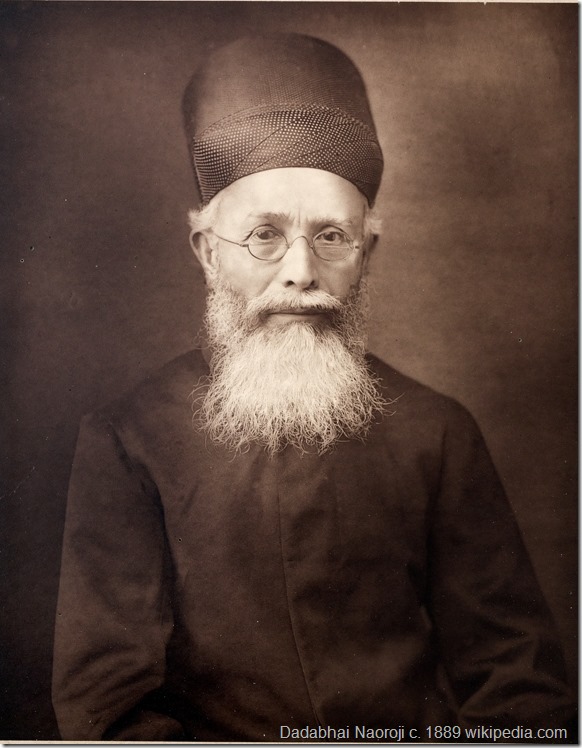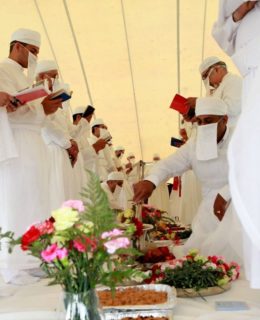On 30 June 2017, many Indians will observe the hundredth death anniversary of Dadabhai Naoroji (1825-1917), an important figure in India’s struggle for independence from British colonialism and the first Indian to be elected to the British Parliament. Naoroji was a Parsi, a member of the tiny Zoroastrian community of India that today numbers only 60,000 in that country. Nevertheless, in the course of his five decades of political work, Naoroji played a vital role in uniting members of India’s diverse religious and ethnic communities into a movement for political reform and colonial emancipation.
Article by Dr. Dinyar Patel, Assistant Professor of History, University of South Carolina, and Chair, Research and Preservation Committee, FEZANA.
 In 1825, when Naoroji was born in Bombay (today’s Mumbai), the British had been a colonial power in India for over eighty years, causing famine and economic disruption in many parts of the country. Naoroji was, himself, born in relative poverty: his parents migrated from southern Gujarat as its local textile economy collapsed. Through his academic performance, however, Naoroji managed to secure scholarships for attending Bombay’s best educational institutions. At the age of 28, he became the first Indian appointed as a full professor in a British-administered college, teaching mathematics and physics. He also began adopting extremely progressive positions on various social issues. At a time when most women in India lacked any form of education, he established some of the first schools in Bombay for girls. Naoroji also criticized the British government for not doing more to educate its Indian subjects.
In 1825, when Naoroji was born in Bombay (today’s Mumbai), the British had been a colonial power in India for over eighty years, causing famine and economic disruption in many parts of the country. Naoroji was, himself, born in relative poverty: his parents migrated from southern Gujarat as its local textile economy collapsed. Through his academic performance, however, Naoroji managed to secure scholarships for attending Bombay’s best educational institutions. At the age of 28, he became the first Indian appointed as a full professor in a British-administered college, teaching mathematics and physics. He also began adopting extremely progressive positions on various social issues. At a time when most women in India lacked any form of education, he established some of the first schools in Bombay for girls. Naoroji also criticized the British government for not doing more to educate its Indian subjects.
By the late 1860s, Naoroji became deeply concerned about another matter: India’s worsening impoverishment under British rule. During the second half of the nineteenth century, India experienced an unusually devastating spate of famines that killed, by the most conservative estimates, over 28 million people.[1] While British authorities blamed these catastrophes on natural disasters alone, Naoroji pointed to another cause. He argued that there was a deliberate “drain of wealth” in India, whereby British policies were siphoning capital out of the country and thereby pushing Indian subjects to the brink of starvation. Collecting and tabulating a wide range of economic statistics—while also disproving the rosier statistics compiled by British officials—Naoroji calculated that the average Indian was, by the 1880s, too poor to buy enough food for a mere subsistence diet. Under British rule, he declared, India had become “the poorest country in the world.”[2]
Naoroji’s “drain theory” caused a great stir in both India and Great Britain: it provided concrete proof of colonialism’s devastating effects upon India, rubbishing British claims of benevolent imperial rule. His writings influenced a generation of Indian and British thinkers, including several prominent British socialists. In time, Naoroji’s writings reached a wider audience across Europe and North America, becoming important resources for incipient anti-imperial movements. For example, William Jennings Bryan, the American Progressive leader, cited Naoroji’s drain theory to explain why he opposed American annexation of the Philippines after the 1898 Spanish-American War.
Having laid out his economic critique of British colonialism, Naoroji forayed into politics. In 1885, he helped found the Indian National Congress, the political party that eventually led India to independence in 1947. Naoroji strove to make the Congress as inclusive as possible. As president of the organization in 1893, for example, he famously stated that, “Whether I am a Hindu, a Muhammadan [Muslim], a Parsi, a Christian, or of any other creed, I am above all an Indian.”[3]
But Naoroji did not just limit his political activity to India. Recognizing that imperial policy was formulated in London, he decided that the best way to influence this policy was to put pressure on the system from the inside. In 1886, he stood for election to the British Parliament as a member of the Liberal Party.[4] Although he lost the election, he generated widespread support among progressively-minded Britons, including suffragists, Irish nationalists, labor leaders, and socialists—individuals who lent their support for India’s political aspirations.
A few years later, in 1892, Naoroji stood for election once more, this time from the constituency of Central Finsbury in London. It was a grueling fight: Naoroji’s opposition lobbed racial barbs at the Indian candidate, while the Conservative prime minister of Great Britain, Lord Salisbury, urged voters not to send a “black man” to Parliament. In the end, Naoroji won the election—by a mere five votes (he earned the sobriquet “Dadabhai Narrow-majority”). Regardless, his victory generated headlines around the world, especially in India. When he returned to India in 1893, crowds in Bombay, Delhi, Allahabad, Lahore, and elsewhere celebrated him as a national hero.
Naoroji’s reception in the British Parliament, however, was much more frosty. He continued to face racist opposition. His pleas for Indian reforms fell upon deaf ears, and his efforts to legislate change garnered little support. In 1895, he lost his reelection bid. Disillusioned with parliamentary politics, Naoroji became more radical, pronouncing British policy in India as “evil” and “a curse,” especially in light of a new spate of famines afflicting the country.[5] In 1906, serving as president of the Indian National Congress once more, he declared that the time had come for Indians to work towards achieving swaraj or self-government. There could be no more time lost on incremental political reforms. Self-government, he stated, was the only way to stop the devastating drain of wealth that had crippled India.
Naoroji retired from politics the following year, at the age of eighty. He left behind a Congress party organization that, in spite of significant internal divisions, was growing more robust and politically confident. His analysis of Indian poverty, claiming that British imperialism was inherently exploitative, became a central tenet in India’s struggle for independence. In addition, he mentored and influenced a new generation of Indian leaders that finally brought an end to the colonial regime. One such leader was Mahatma Gandhi, who had received Naoroji’s assistance while campaigning for the rights of Indians in South Africa. A few months after Naoroji’s death, Gandhi summarized his legacy: “Dadabhai’s flawless and uninterrupted service to the country, his impartiality, his spotless character, will always furnish India with an ideal to follow.”[6]
Further Reading
Masani, Rustom P. Dadabhai Naoroji: The Grand Old Man of India. London: G. Allen & Unwin, Ltd., 1939.
Mehrotra, S.R. and Dinyar Patel. Dadabhai Naoroji: Selected Private Papers. New Delhi: Oxford University Press, 2016.
Naoroji, Dadabhai. Poverty and UnBritish Rule in India. London: Swan Sonnenschein & Co., 1901.
Patwardhan, R.P., ed. Dadabhai Naoroji Correspondence, parts I & II. New Delhi: Allied, 1977.
[1] These estimates were for the years 1854 to 1901. William Digby, ‘Prosperous’ British India (London: T. Fisher Unwin, 1901), pp. 129-30.
[2] “Famine in India: Address by Mr. Dadabhai Naoroji,” India, 1 March 1901, p. 103.
[3] Speeches and Writings of Dadabhai Naoroji, ed. G.A. Natesan (Madras: G.A. Natestan & Co., 1917), p. 59.
[4] Due to the lack of clearly-defined policies on citizenship, it was possible, in those days, for a British colonial subject to stand for a seat in a British constituency, and several Indians did so from the 1880s onward.
[5] Private correspondence, Dadabhai Naoroji Papers, National Archives of India, New Delhi.
[6] Collected Works of Mahatma Gandhi, vol. 14 (Delhi: Ministry of Information and Broadcasting, 1965), p. 61.





